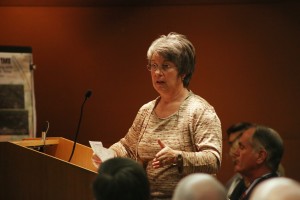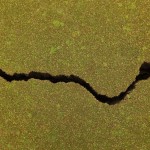Why Texans Are Hearing a ‘Loud Boom’ During Earthquakes

Photo by Sam Ortega/KUT
Residents of North Texas testifying before the Railroad Commission in Austin in January 2014.
A Very Different Oil and Gas ‘Boom’ Comes to Texas
“You might think you were in Iraq or Afghanistan,” Greg Morrison told a panel of state officials in Azle, Texas recently. “It feels like a semi truck hitting your house with a bomb going off.”
He was describing the experience of a 3.6 magnitude earthquake that hit his North Texas town late last year. Earthquakes were all but unknown in the area until a few years ago; now communities in the region are experiencing dozens of them, sometimes multiple times a day. In fact, there was one near the North Texas community of Benbrook just this weekend.
North Texas is not alone in being shook up. As the oil and gas boom has taken off, several areas of Texas (as well as other states) are experiencing quakes. These are often areas where drilling is taking place or where drilling waste water disposal wells are present. And, in many instances, residents are reporting loud noises — a “boom” — along with the shaking.
“I have children that are terrified at night when these things happen,” a mother from Azle, in North Texas, recently told a meeting of the Railroad Commission of Texas (the state’s oil and gas regulator). “When these things happen [there are] massive booms. It sounds like someones crashing into the house.”
Earthquakes are known more for their destructive force than for the noise they produce, but a phone call to William Ellsworth, a seismologist with the United States Geological Survey Earthquake Science Center in Menlo Park, California, confirmed that they can be heard as well.
“When a fault slips suddenly underground it radiates two different kinds of seismic waves,” Ellsworth tells StateImpact Texas. “One is called a P wave and this is an acoustic wave, the same kind of wave that we hear with our ears. The other wave is an S wave or shear wave, and it’s the wave that carries most of the energy that we typically feel.”
Ellsworth says that P wave travels faster than the S wave and when it reaches the earth’s surface it can create a loud noise under the right conditions.
“So it’s a little like thunder,” Ellsworth says. “You may see the flash in the distance, and then it takes a while for the air wave, in this case, to propagate, and make the boom that, in this case, you associate with lightening.”
The phenomenon may not be very well known because it is more common with smaller earthquakes. Having experienced myself the Northridge Earthquake in Los Angeles in 1994, I emailed Ellsworth to ask why I had heard no “boom” in that event.
“Microearthquakes (magnitudes below 3) are often better at producing an audible sound, as the peak in their energy spectrum is in the range of human hearing,” Ellsworth wrote back. “A big earthquake like Northridge has its peak at frequencies far below what we can hear.”
It’s the other wave, the S wave, that can cause damage. But the loud booms experienced in Texas are, at very least, rattling nerves.
The booms from quakes aren’t limited to the quake swarm in North Texas. In other areas that have seen quakes recently, residents say they’re hearing them, too.
“The whole house shook and it looked like it was going up and down and there was a sonic boom at the same time,” Alley Koteras told KTBS 3 about a 2012 quake in the East Texas town of Timpson.
“I heard this loud noise and I thought it was a truck hitting the back of our house,” Pat Jones, from the West Texas community of Snyder, told television station KCBD about an earthquake there in 2010.
 “I heard what appeared to be a boom or a loud noise, and just as soon as I heard the noise, then the house shook,” Jerry McVey, of Euless told the Associated Press about an earthquake that struck his community northeast of Fort Worth in 2009.
“I heard what appeared to be a boom or a loud noise, and just as soon as I heard the noise, then the house shook,” Jerry McVey, of Euless told the Associated Press about an earthquake that struck his community northeast of Fort Worth in 2009.
You can read more about the connection between oil and gas drilling activity and earthquakes at our topic page: How Oil and Gas Disposal Wells Can Cause Earthquakes.


